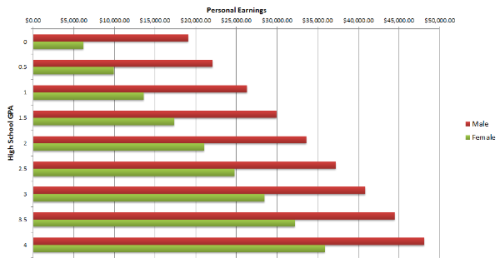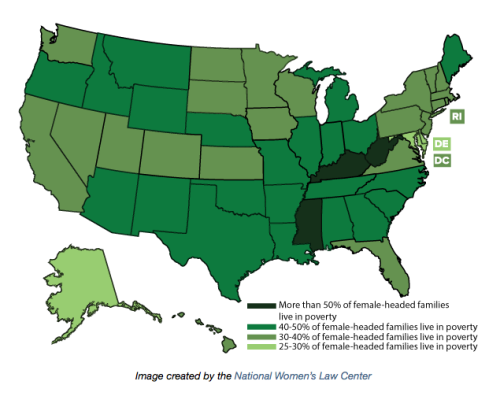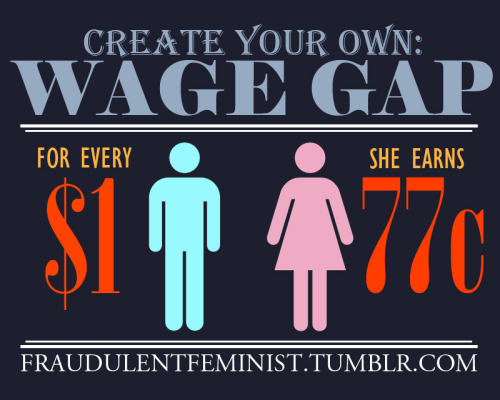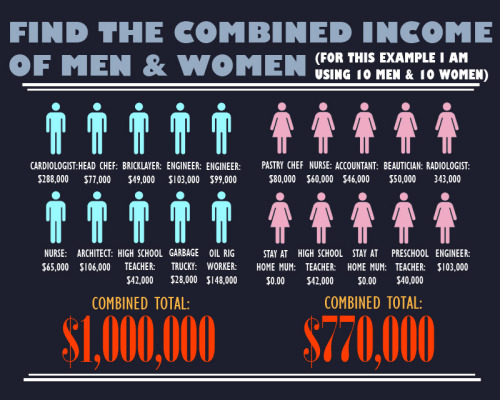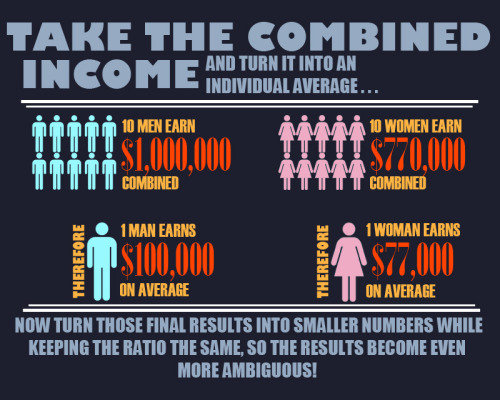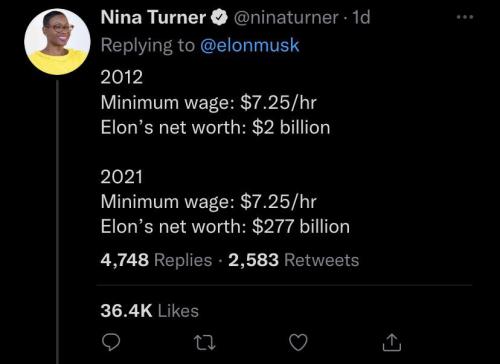#wage gap
Friendly reminder that all misandrists are beautiful and fabulous
Since the dawn of time, or at least the dawn of the GPA, high school students have been hearing that grades matter. Now, a University of Miami study backs up that parental talking point: The better your GPA, the higher your income is likely to be 10 years after graduation.
But as @think-progress points out, this doesn’t mean that girls with good grades earn more than boys with mediocre ones.Quite the contrary, in fact:
A woman who got a 4.0 GPA in high school will only be worth about as much, income-wise, as a man who got a 2.0. A woman with a 2.0 average will make about as much as a man with a 0 GPA.
Other depressing findings: Girls have significantly higher average GPAs, but “men will still end up having significantly higher income later on,” Think Progress says.
And the GPA-gender wage gap continues through college and grad school:
A woman who is one credential ahead of a man will always be worth less in terms of income: a woman with an associate’s degree makes less than a man with a vocational degree, a woman with a bachelor’s makes less than a man with an associate’s, and a woman with an advanced degree makes less than a man with a bachelor’s. Even among recent college graduates with the same grades, majors, and career fields, men will make more in their first jobs.
(Chart via U of Miami)
Post link
There’s a significant teenage gender gap in earning, spending, saving, and planning for the future, according to the 2014 Teens and Personal Finance Survey byJunior Achievement and the Allstate Foundation. think-progress takes a deeper look at the study here.
Post link
Screenshots from the website of the Buffalo Jills, the official cheerleading squad of the NFL’s Buffalo Bills, which has been hit with a class-action lawsuit alleging numerous wage violations under NY state law.
According to the suit brought by five Jills, not only were the cheerleaders required to provide more than 800 hours of uncompensated labor every year (at games, practices, and special appearances including private parties, The Jills Annual Golf Tournament and something called “The Man Show” at a Niagara Falls casino), but they paid for their own uniforms, makeup and gas money and weren’t even allowed to keep tips. At the same time, the women allegedly had to obey a long list of rules on everything from manicure type (french or clear polish only) to the amount of “jiggle” on their bodies (none) to “how to properly wash ‘intimate’ areas and how often to change tampons” (yes, the suit really says that).
Bills team officials declined comment, citing the pending litigation. Meanwhile, the Jills’ management company announced it was suspending activities indefinitely; otherwise, it told USA Today, it had comment.
Post link
The companies in MoJo’s 2012 dataset: Apple, HP, Intel, Google, Cisco, Oracle, eBay, Facebook, Gilead Sciences, and VMware.
Post link
Modern feminists have no problem complaining about how unfair the taxing of tampons and pads are… Where are they for the women in Middle-Eastern countries who are being raped, beaten, and killed? Or is that less of a priority? While you’re protesting the wage-gap, their lives are in danger. Is modern feminism really that selfish? Help them to be treated as humans before you worry about man-spreading.
“I need feminism because… I definitely deserve to get PAID as much as (or more than) anyone else.”
- If you are a casual worker, you do not deserve to get paid as much as the store manager.
- If you are a high school teacher, you do not deserve to get paid as much as a university professor.
- If you are a nurse, you do not deserve to get paid as much as a doctor.
- If you are an apprentice chef, you do not deserve to get paid as much as the head chef.
- Just because you are a woman, doesn’t mean you deserve to get paid as much, or more than a man (and vice versa).
No one deserves anything, especially if the only factor contributing to that entitlement is your gender. You earn your pay. Simple as that. If you choose a lower income job, then you need to realise that you will earn a lower income than someone else who has chosen a higher income job.
How about an example to make this more clear:
CHILDREN GET PAID 2c FOR EVERY DOLLAR AN ADULT MAKES!
Now, is it reasonable to call that discrimination towards children? Should we stage protests and demand an intervention to ensure that parents are forced to pay their kids $11.45 for every hour that they stand at their shitty homemade lemonade stall? No, because in the situation involving the children/adults wage gap, it is so blatantly obvious that the statistic involved doesn’t disclose some really crucial information such as:
- How often do children work, compared to adults?
- How much time off do children take, compared to adults?
- How labour intensive is the work children do, compared to adults?
- Do the majority of children actively choose lower income jobs to accommodate their lifestyles, compared to adults?
- Do the majority of adults sacrifice a larger portion of their time and lifestyle to take these higher income jobs, compared to children?
So when we spew around this statistic about women earning 77c for every dollar a man makes… Why isn’t it is so blatantly obvious that the statistic involved doesn’t disclose some really crucial information such as:
- How often do women work, compared to men?
- How much time off do women take, compared to men?
- How labour intensive is the work women do, compared to men?
- Do the majority of women actively choose lower income jobs to accommodate their lifestyles, compared to the majority of men?
- Do the majority of men sacrifice a larger portion of their time and lifestyle to take these higher income jobs, compared to women?
Is this really so hard to comprehend, or are we going to blame the patriarchy again?
-fraudulentfeminist
(PS. Most modern countries have some sort of legal watchdog that prevents and punishes discrimination in the workforce. In Australia we have what is called the Fair Work Ombudsman that gives out information and advice and informs you of your legal rights for those who find themselves in situations that involve discrimination. If you are being discriminated against in the workforce, including payment issues, these institutions will help you out. You don’t have an excuse not to ask.)
Post link
PSA: The wage gap isn’t real
So fun fact! Depending on your sources, the wage gap varies, but it really isn’t the fundamental issue when we are looking at pay inequality in the US.
There are many other factors that come into play when talking about PAY GAPS: Women have less success in gaining promotions than their male counter parts (and other Glass Ceiling effects), women are dissuaded from higher paying fields (such as STEM fields) through institutional hostility, women are expected to take unpaid maternity leave for child care when men are not (regardless of whether or not they will), women are less successful at salary negotiations and are sometimes even penalized by employers for trying at MUCH higher rates than men, work that is traditionally female dominated being undervalued on a cultural level (women might be cooks, but not chefs; nurses, not doctors; etc.), when women begin to work in traditionally male fields in higher numbers the pay for those fields drop, and men in traditionally female fields tend to be promoted more quickly and get paid more, and a myriad of others.
We know, for example Women need an additional degree in order to make as much as men with a lower degree over the course of a lifetime.A woman would need a doctoral degree, for instance, to earn the same as a man with a bachelor’s degree, and a man with a high school education would earn approximately the same amount as a woman with a bachelor’s degree.
The fact is that women, on average, DO make less than men, and the issue isn’t always direct illegal wage imbalance. The issues are often far more wide reaching and speak to a cultural misogyny that has to be confronted beyond just legislation.
I mentioned maternity leave earlier. (Did you know that the US is one of the only “industrialized countries” in the world to NOT have guaranteed paid parental leave? yeah. That’s fucked up.) The entire notion that women, more so than men, are expected to take off time from work for family is one of those cultural aspects of inequality that I mentioned.
And all this discussion fails to take into account things like disability, trans people, sexuality, and race, which makes all of these issues even more extreme and complicated.
This is a really good article to read for more information:
This is my shit!
fandomsandfeminism talked about several of the major contributors to the wage gap, including:
1. Discrimination in promotions
Women are typically overqualified compared to their male counterparts, are promoted less frequently, and are passed over for promotions when they have the same experiences and qualifications as men. For example, white male professors who do the least service and mentoring get promoted the fastest. Female managers are also held to stricter standards for promotion than men. Women with more than a high school education do not leave jobs more frequently than men, and female managers even have slightly lower turnoverthan male managers.
2. Dissuasion from higher paying fields
Millennial men are less open to accepting women engineers than older men are. Only 41% of millennial men are comfortable with women engineers, compared to 65% of men 65 or older. Women get burned out working in the tech industry because they are underpaid, undervalued, and underappreciated in their Millennial male-dominated fields.
3. Structural disadvantage
Paid family leave is not mandated in the US, but women are more likely to return to work after having a baby when they have paid family leave, and men who take paternity leave spend more time on child care later.
Investing in a universal, free childcare system, in which workers are paid a decent wage, would create 1.65 million jobs and reduce the gender pay gap. Most of the investment would be recouped through increased tax revenues and lower welfare spending. In Canada, women’s participation in the workforce increased substantially above trend levels when marginal taxes and the net costs of child care were reduced.
4. Penalties for negotiating
Both men and women are more likely to rate women as “less nice” and are less interested in working with them if they ask for more money. Women are aware of how they’ll be viewed if they ask for more money, and therefore don’t ask. Women ask for much more moneyif they’re negotiating for someone else because they don’t have to fear appearing selfish and greedy. Employers outright lieto women more often during negotiations. Furthermore, a recent study in Australia found women ask for pay raises at the same rate as men but receive them less. 19% of women vs. 33% of men got raises when they asked.
5. The devaluing of work associated with women
People view men’s and women’s work differently. There is a tipping point at which men flee an occupation, and in the absence of perfect information, workers take the percentage of female employees as a proxy for an occupation’s prestige. When teaching in the US became female-dominated, the pay decreased. When programming in the US became male-dominated, the pay increased. Doctors save lives and go to school for many years no matter where you are in the world. But in Russia, where doctors are mostly women, they are paid the same wages as secretaries, making about 12,000 US dollars a year. A study of Census data from 1950 to 2000 found that when women enter an occupation in large numbers, that job begins to pay less, even after controlling for a range of factors like skill, race, geography, and occupational crowding.
Men’s low-wage jobs demand far less in terms of skill, education, and certifications than women’s low-wage jobs, yet the male-dominated ones usually have higher hourly pay. Janitors, who are mostly men, make 22 percent more money than maids and housecleaners, who are mostly women, despite the jobs requiring identical skills.
6. Special treatment for men in female-dominated fields
Even in job fields where women dominate, men are paid more for the same roles. Men in nursing outearn women by nearly $7,700 per year in outpatient settings and nearly $3,900 in hospitals in the US after controlling for a large number of variables. Men in female-dominated fields aren’t marginalized at all; they get special treatment, are fast-tracked to the top, and receive preferential hiring (often by other men who were also fast-tracked to the top).
7.Disabledpeople,transpeople,gay people, and peopleof color also see wage gaps with their more privileged counterparts
There are many other important reasons for the wage gap, including:
8. Pay secrecy
You can’t demand higher pay if you don’t know you’re being underpaid. In the 11 US states where pay secrecy is unlawful, the gender wage gap is smaller. In government jobs, where pay transparency is required, the gender pay gap has shrunk to just 11-13 percent. Unionized workers, who also require pay transparency, have a wage gap of 9 percent.
9. Women’s unpaid labor
Women tend to put in fewer hours of paid work than men, but when unpaid work is added to the equation, women all over the world tend to work slightly morehours per day, per week, and per year than men. Women in the US proportionately still perform much more housework and childcare, such as managing children’s schedules and activities, taking care of sick children, and doing chores, than men. Men still perform only half the housework and childcare that women do. This doesn’t look like it will change soon: Fewer than half of Millennial women believed they’ll handle most of the child care, but two-thirds of their male peers believe their wives will do so. When the time women spend on unpaid work shrinks to three hours a day from five hours, their labor force participation increases 20 percent.
10. Long hours != greater contribution to company
The worth of work should be evaluated by productivity rather than time. Long hours backfire for people and companies. Managers can’t tell the difference between those who worked an 80-hour week and those who pretend to. Pharmacists have one of the smallest wage gaps because the pay is measured by productivity rather than time.
Even in workplaces that offer flexibility, however, women havereported penalties for taking advantage of flexible work options, such as loss of responsibility or longer hours than promised. Flexible work hours will work only if that attitude changes.
The point that “men earn more because they put in more hours at the company” is untrue anyway. The wage gap between women and men remains steady whether we compare employees working 40 hours a week, 41-44 hours a week, 45-49 hours a week, or 50+ hours a week.
11. Motherhood penalty
Womenearn 10% less for each child they have, while men earn 6% more for each child they have. Mothers face a lot of stereotypes at work: they get competency ratings 10% lower than other women, and they’re also called back half as often as fathers for jobs. To thecontrary,studies have found that moms are more productive workers. The thought-leadership industrial complex has even called having kids a “productivity hack.”
12. Implicit bias
Even after controlling for all variables known to affect earnings, there is still a wage gap of about 6.6% in the US. Accounting for these variables explains only about 60% of the wage gap in the US. In Australia, these factors only account for about 40% of the gap.
There are almost innumerable examples demonstrating implicit gender bias. Resumes with women’s names are given 12% lower starting salaries than the exact same resumes with men’s names. Employers are more likely to hire a male job applicant than a female job applicant with an identical record. Employers reported that the male job applicant had done adequate teaching, research, and service experience compared to the female job applicant with an identical record. If there is only one woman in a pool of candidates, her chances of being hired are statistically zero. Mentoring does not provide the same career benefits to women as men and that women are “championed” less often by senior management for promotions and raises.
Luckily, people can overcome their unconscious biases. Employers for university STEM faculty were 6.3 times more likely to make an offer to a woman candidate when the employers had been presented with an intervention, including discussion of implicit bias. Sadly, women who bring up concerns about diversity in the workplace receive worseevaluations from their bosses than men who bring up the same concerns.
13. Just blatant sexism
Married men with stay-at-home wives are significantly more likelytoview women in their workplace unfavorably, are much less likely to take jobs at companies with female board members, and pass over female co-workers for promotions.
Three-quarters of Millennial women anticipate that their careers will be at least as important as their partners, while half the men in their generation expect that their own careers will take priority.
Women are not as respected as men in leadership roles, especially by the men over whom they have a leadership role. Women in leadership positions receive less favorable evaluations because they are perceived to be violating gender norms. Male students systematically overestimate the knowledge of the men in their classes in comparison with the women despite clear evidence of women’s superior class performance.
Millennial men are less open to accepting women leaders than older men are. Only 41% of millennial men are comfortable with women engineers, compared to 65% of men 65 or older. Likewise, only 43% of millennial men are comfortable with women being U.S. senators, compared to 64% of Americans overall. The numbers were 39% versus 61% for women being CEOs of Fortune 500 companies, and 35% versus 57% for president of the United States.
There are many proven ways to reduce the gender wage gap, including:
- Mandate paid family leave.
- Invest in universal, free childcare, or at least invest in reducing marginal taxes and the net cost of childcare.
- Confront implicit biasthrough training and intervention.
- Raise the minimum wage.
- Mandatepaytransparency.
- Prohibit employers from inquiring into prospective employees’ wage histories.
- Create more flexibility for jobs by valuing productivityover contact hours.
- Remind workers of their rights.
- Performyour fair share of unpaid labor.
- Change cultural norms so it is more acceptable for moms to work and dads to take care of children.
- Support women’s ideas in your workplace. When a female colleague’s point is ignored, pile on and emphasize the point, making sure you acknowledge that it was her idea. When a qualified female colleague is consistently passed over for a promotion, ask your boss to promote her.
But we can’t get any of these done because these people are out here plugging their ears and saying “the wage gap isn’t real.” If you need more convincing of why you should help the gender pay gap, please read this post.
this is like just a fourth of a whole musical medley addressing that you can’t live like the simpsons anymore. harsh :(
This must be the closest the simpsons has come to decent social commentary in a while
This same season had an episode about Cancel Culture that was actually surprisingly good
-While undeniable that people overreacted to Homer’s mistake, the episode makes clear that Homer made the situation worse by doubling down and insulting people (“You’re all too sensitive!”) rather than appologizing or simply keeping his head low until the moment passed.
-shows how people use cheap, performative stunts to change public opinion about them while also pointing out that, at times, people are too critical regarding people that legitimately want to change.
-Points out that those that benefit most from “cancelling Cancel Culture” are NOT Average Joes Who Made a Little Mistake™️ but objectively awful and dangerous people (includes not-so-subtle callouts against Trump and Martin Shkreli–I’m spelling his nams based on how I hear it, the Insulin guy).
-Doesn’t actually use the term “cancel culture” once in the episode! So it doesnt come off as an old man shouting angrily at a cloud, but instead as a perfectly cromulent social commentary about social faux pas and punishment.
Really, The Simpsons has some pretty good takes on social issues sometimes…unless it’s regarding Apu.
This actually makes me want to start watching again
oh and all of a sudden when feminists start talking about the “wage gap” there’s only two genders ok.
Post link
The irony is that there are plenty of millennials trying to purchase a home, the problem isnt due to a lack of funds, but a lack of supply of homes not meeting the high demand.
Post link



